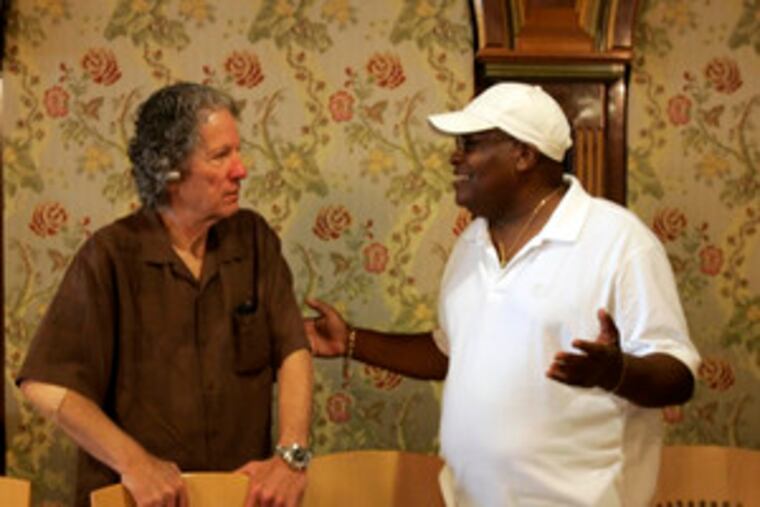
'Where's Rappaport?"
This is Perloff, talking to Swede.
"I want to get that story!" Perloff says.
He's talking about Rappaport's love life, naturally. What other question could be on the mind of two dozen guys in their 60s and 70s sitting in the back room of a diner on Roosevelt Boulevard awaiting two dozen servings of bacon like characters left out of a Philip Roth novel?
But forget Rappaport's love life for a second.
It's the record business these guys (and Carol Tinari, the-once-and-forever girl of the bunch) have gathered to chew over: a business they lived and breathed and drank down like nectar in their prime; officially their job but totally their life; based in Philly, but with a reach to Detroit and New York; their obsession and their irritation; a calling that grabbed them like nothing else ever would; that they hung on to, even after, in an upset, it pretty much kicked the bucket before they did.
And so here they are, as they are about once a month, reliving, as more than one person put it, "the bull-."
"Twenty-five, 30, 35 losers," summed up Marshall Verbit, owner of now-defunct Marnel Distributors, which sold records to now defunct department stores, Korvettes, Kleins and Gimbels.
"We were all in the wholesale business when there was a wholesale business," he said. "We were in a business that doesn't exist anymore."
Losers, they weren't. It was huge, this stuff, back in the '50s, '60s and '70s. Leo Swede, for one, owned 122 Wall to Wall Sound stores.
"In this room, with distribution and record companies, you probably did $700 million out of Philadelphia," said Ron DeMarino.
These guys were the Philadelphia reps for major record labels like Universal, Atlantic and Motown - back when major labels had Philly reps; they were the promotion guys, the distributors, the wholesalers, the record store owners, the one-stop owners that sold to the independents, the disc jockey schmoozers, the marketing people and, in a few cases like Jerry "I'm Gonna Make You Love Me" Ross and Billy Jackson of the Tymes, the songwriters and performers.
"The one thing we did was we outlived the record business because there is no record business anymore," said Mario Daulerio, 76, whose company, Abko, distributed Motown records between 1965 and 1982. "That's a good one, isn't it?"
It is. Even if what's left of it can be played only in their memories, and over piles of bacon. Theirs was a time when people moved the music, not fiber optics; when a relationship with a DJ, a nice dinner, a little payola maybe, could land a record on the radio, WFIL, WIPG, WHAT, WDAS, and that force of charm and taste and determination could jump-start a song into a bona fide hit.
"And they're all still charming," said Carol Tinari, now a consultant and a member of the Philadelphia Zoning Board. "It was so much fun," she said. "I feel we shaped the world of music."
The demographics of the back room at Tiffany's brought back the memories as well: a lot of Jews, not as many Italians, three or four blacks, a token Irish or two, and a couple of younger women.
"We all had jobs, and we made it fun," said Buddy Dee, 64, who worked for Universal and then Atlantic in promotions, a job aided by his mom's status as Mary Dee, a well-known DJ at WHAT. "We weren't envious of each other. We were always crashing each other's affairs. It was a party. It's not like that now."
The regular gathering got started with just a few guys, and took off after a funeral, what else, in which a few more past connections were made. Word of mouth has led to as many as three dozen for the 10:30 a.m. breakfast. They stayed about 21/2 hours.
Any hard feelings were long smoothed over into shtick. But still, things were as complicated as figuring out how to get another $10 for the Russian waitress at the end. (Bobby Perloff told Gary Hendler, 55, to get a dollar from everyone; fearing hostility, Hendler just gave him $10. Tom Kennedy wanted to put the tab on his American Express, take the $300 in cash, but thought better of it. Still, haggling over stuff, a wad of cash in the middle, felt like old times).
"I put him out of business," Perloff needled the guy sitting next to him at breakfast, Norm Cooper. "I still feel s- about the whole thing."
"They grew, and I shrunk," Cooper said.
"Not one of us knew how large the business was getting," Perloff said.
"It was all bull, but turned into a crazy situation," Cooper said.
And then it ended, the business changed, got more centralized, more digitized, less personal, less profitable for the little guy, budgets at record labels shrunk and nobody needed a promotional, distribution staff in every city. And frankly, these guys got older. Most would've been retired by now anyway, arguing over condo politics and golf times. "There's nothing to promote because you can't see anybody," said Gunter Hauer, once an executive at Atlantic. "The business is different now."
And then, with Weldon McDougal pushing his latest CD, Philadelphia Soul Rarities, into hands, Perloff still ordering Hendler around like the kid he once was, Carol Tinari as happy as ever to be back again as the chick in this guys' world, all of them lit up by just getting together for breakfast - the piles of bacon disappeared, the hours of bull piled up, and it was time to go. Some left quickly. Others looked as if they were ready to segue into lunch.
Nothing left but the gold records, which, operators that they are, most of these guys have assigned to Kennedy to sell on eBay. Until the next time at the Tiffany, in October.